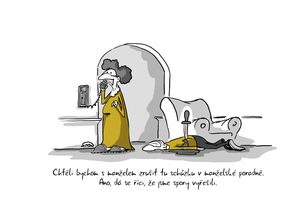Household consumption and investments were the main GDP drivers in Q3
Today, the Czech Statistical Office released updated GDP figures for the third quarter of this year. Qoq growth slightly improved from 0.3% to 0.4%. From the demand side view, the main drivers were household consumption and investments. If we look at the supply side, value added increased in almost all sectors (except in industry, financial and insurance activities and other service activities).
HH consumption has been on an uptrend since the middle of last year (a cumulative increase of 2.1% and 0.3% qoq in Q314). The improvement in consumer confidence and higher real spending were supported by fiscal policy (previous fiscal consolidation turned into fiscal consolidation with a positive impact on real disposable income) and the improving labour market and low inflation. The FX intervention regime has so far led to increased volatility at the turn of 2013/14 as it increased spending in Q413 (people feared price increases, especially of imported goods) with a following drop in Q114. Positive impacts of FX intervention can be seen mainly in the export-oriented industrial sector. The weaker crown will support consumption as well through a better labour market situation, but with a time lag. We expect HH consumption to increase 1.5% on average this year and 2.4% next year.
Fixed investment activity also grew in Q3 ( 0.3% qoq). Investments started to rise in the middle of last year, thus at the same time as HH consumption (cumulatively 4.8%). Despite relatively solid growth, investment activity is still subdued in comparison with pre-crisis levels (10.4% lower in comparison with Q308). Therefore, there is plenty of room to grow, especially given that the weaker Czech crown has significantly improved the operational profits of non-financial corporations, and capacity utilisation in the manufacturing industry is close to its long-term average. Moreover, a recovery is under way on the real estate market, which supports investment in housing. Finally, the government is expected to provide more funds for infrastructure projects. Overall, we expect fixed capital investment activity to increase in the following quarters. On average, fixed capital investment should increase 4.2% this year and 4.8% in 2015. The inventories contributed positively to GDP growth in Q314 too ( 0.4pp); on the other hand, mild negative contribution stemmed from net exports (-0.1pp) and government consumption (-0.7% qoq).
From the supply side view, value added decreased in industry (-1.3% qoq in Q314), financial and insurance activities (-2.7%) and other service activities (-0.8%). Value added increased most in agriculture, forestry and fishing ( 7.3%), which was supported by this year?s better harvest. The construction sector is improving, as well ( 2.8%). Value added in private services increased overall 0.7% and in public services 1.0%. The total gross value added grew 0.4% qoq, which was the same pace as that of GDP.
The Czech economy started its path to recovery in the second quarter of last year. We may now be seeing its first stumble caused by worsening conditions on our main export markets combined with the effect of sanctions between the EU and Russia. Although there is a chance that the EMU and Germany may drop into a technical recession, the Czech economy should escape one thanks to the expansionary fiscal and monetary policy. However, the situation will be difficult till the end of this year and perhaps at the beginning of next year, as well. Next year, we see recovery getting back on track and the economy gradually moving back to its potential level. We expect average qoq growth of 0.8% next year. The situation in Germany and the EMU should start to improve again in Q214. Thus, the situation abroad, together with expansionary domestic fiscal and monetary policy, should be effective engines for growth next year. We expect GDP to increase 2.3% on average this year and by the same amount in 2015. The risks are still concentrated on the downside: another increase in geopolitical risks, a recession in the EMU accompanied by deflation and a hard landing of the Chinese economy.
Autor: Jiří Škop
Tyto zprávy pro vás vytváří Investiční bankovnictví KB.
Poslední zprávy z rubriky Investice:
Přečtěte si také:
Prezentace
25.04.2024 Pobřeží Egejského moře - ideální tip na všechny...
24.04.2024 Výsledková sezóna: Jak se daří výrobcům čipů a...
23.04.2024 Podle čeho vybírat plechový zahradní domek?
Okénko investora

Štěpán Křeček, BHS

Petr Lajsek, Purple Trading

Ali Daylami, BITmarkets

Michal Brothánek, AVANT IS

Olívia Lacenová, Wonderinterest Trading Ltd.
Evropský průmysl zelené energie má problém: Společnosti se stěhují do USA

Miroslav Novák, AKCENTA
Spotřebitelská inflace v eurozóně odeznívá, pro služby to však úplně neplatí

Jiří Cimpel, Cimpel & Partneři

Jakub Petruška, Zlaťáky.cz


_w60h45_w76h50.png)
